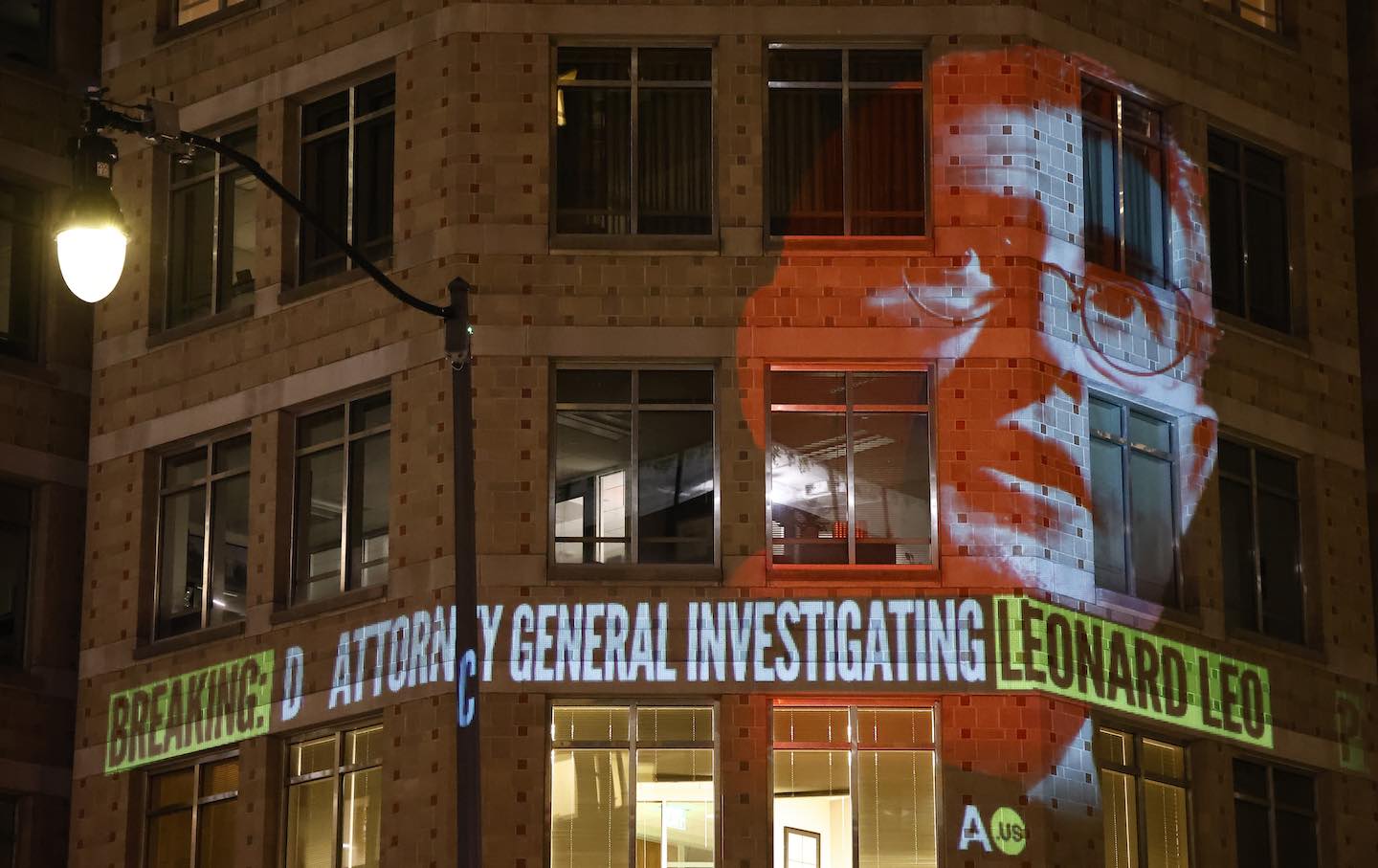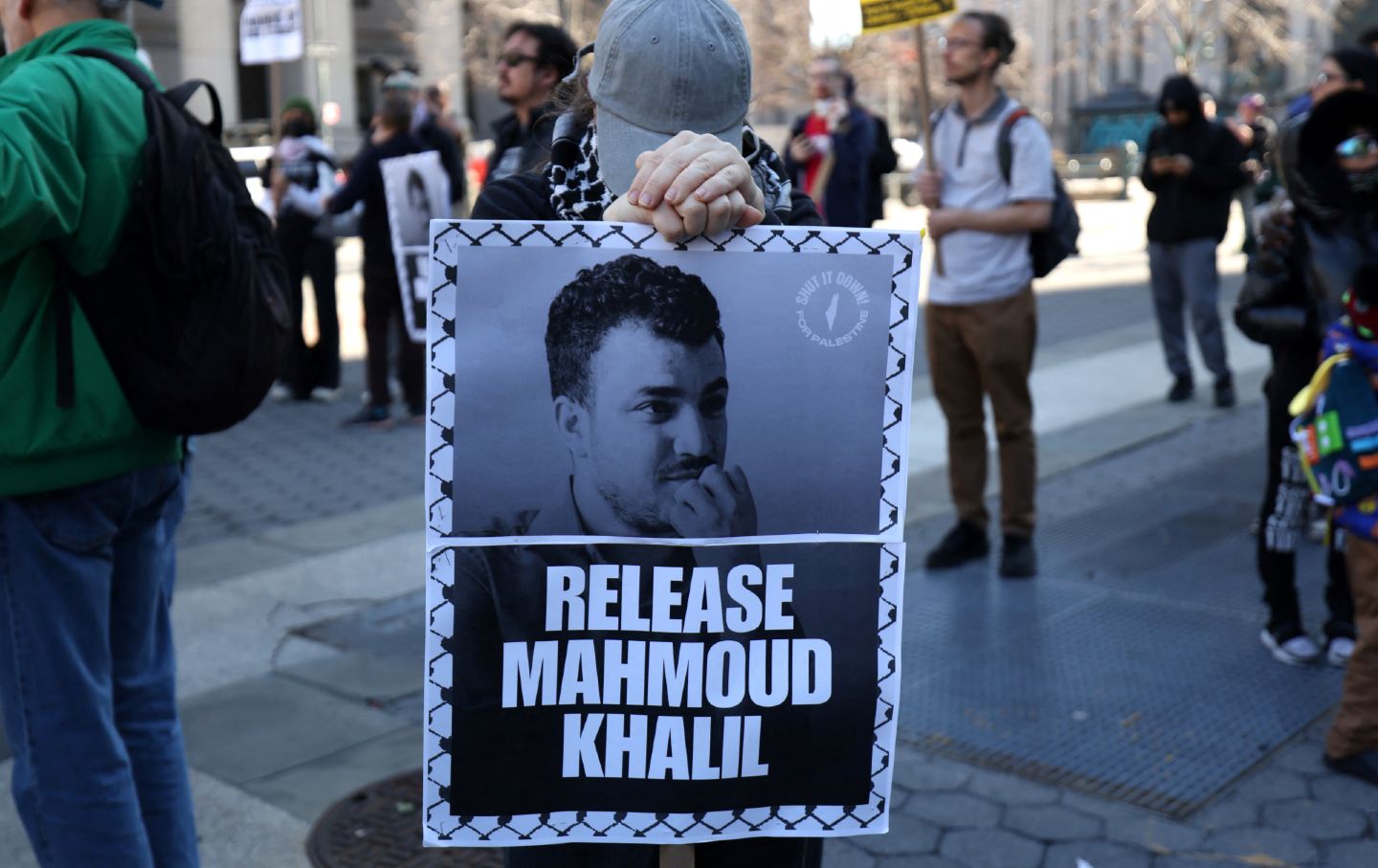The Man Behind the Right-Wing Supreme Court Wants to “Crush” the Liberal Media
The conservative activist Leonard Leo has declared his intention to spend $1 billion on promoting right-wing ideas in news and entertainment.

Government watchdog Accountable.US projects a graphic onto the Federalist Society building to highlight news of DC Attorney General Brian Schwalb’s investigation into conservative kingpin Leonard Leo’s nonprofit network in August 2023.
(Paul Morigi / Getty Images for Accountable.US)Leonard Leo, the main architect of the right-wing capture of the American judiciary, has a new target in his sights: the American media, which, in his view, is rife with bias and leftist agitprop. In an interview with the Financial Times, Leo—the founder and cochair of the Federalist Society—said he expects this initiative will take up $1 billion of the $1.6 billion that Chicago electronic device heir Barre Seid used to bankroll the Marble Freedom Trust, Leo’s ambitious new nonprofit foundation to spread right-wing influence across the cultural landscape. “We need to crush liberal dominance where it’s most insidious,” Leo told FT reporter Alex Rogers. “So we’ll direct resources to build talent and capital formation in the areas of news and entertainment, where leftwing extremism is most evident.”
It’s unclear whether Leo intends to marshal these capital investments behind a new media brand or seeks to have future right-wing commentators, editors and reporters matriculate in a Marble-branded ideological boot camp—something akin to Bari Weiss’s University of Austin for a new media elite. Leo indicated that he was thinking of purchasing a media property in a local market, but he’s not yet settled on one.
While $1 billion won’t get one very far toward establishing a game-changing media property on the scale of Rupert Murdoch’s Fox News empire, it’s still a commitment that can wreak no small amount of havoc in a media industry that is starved for revenue and already routinely defers to right-wing actors and agendas. After all, the news just broke last week that enterprising Russian propagandists were able to line up a roster of obliging video and social media hacks—er, pardon me, influencers—for a comparatively modest $10 million outlay. No doubt Leonard Leo regards such flailing efforts as a personal challenge.
Besides, Leo’s proven MO is not to erect the foundations of a right-wing counter-establishment from scratch—rather, it’s to selectively target the creaking joists and load-bearing walls in a vulnerable property, in order to accelerate its demolition and reconstruction along strict new ideological lines. The Federalist Society’s successful decades-long infiltration of the court system—culminating with the appointment of Justices Amy Coney Barrett, Neal Gorsuch, and Brett Kavanaugh during the Trump administration—offers a grim playbook that would be easy to duplicate in America’s feckless and wayward news business. “The American news industry is so weakened right now that Leo could buy a conservative majority on the editorial board of The New York Times with less money than it cost him to keep Neal Gorsuch’s seat on the US Supreme Court warm for him,” says David Daley, whose recently published book Antidemocratic chronicles the long reach of the legal revolution Leo charted in American law and politics.
Daley also notes that Chris Jankowski, who brokered the maga-donation launching the Marble Freedom Trust, is a battle-tested elections warrior who remade the US electoral map—with the Robert’s court’s eager connivance—into a gerrymandered deep-red hellscape. “The $1.6 billion slush fund in the Marble Freedom deal was brokered by Jankowski,” Daley says. “He’s the person who pioneered the GOP’s Redmap efforts in 2010—who understood that, with just $30 million in chump change change, the Republicans could buy state legislatures in North Carolina, Wisconsin, Michigan, Pennsylvania, and other key states, and in most cases, never give up that power a decade and a half later.”
“You put this alongside the work of someone like Leo, who has underwritten the takeover of the US Supreme Court, the ideological capture of the Fifth Circuit and other lower courts. Then you have the efforts to place known Federalist Society acolytes in known supreme courts in key states, and the coordinated funding the Federalists have done across groups like the Republican Leadership Committee and the Republican Attorney Generals Association. These people mean business, and they know how to get things done.”
And as was the case with Leo’s takeover of the courts, his new media initiative will target a civic institution in grave decline. Back in the 1950s, A.J. Liebling called the press “the weak slat under the bed of democracy,” but amid present industry practices and ideological positioning, the slat has been winnowed into something more like a toothpick. The mainstream political press has fastidiously gilded the demented outbursts, violent threats, and coup-promoting tirades of Donald Trump, while treating the right’s institutional war on democratic governance as just more major-party strategic byplay, to be “both-sides”-ed into insignificance.
This election season offers many other sickening cases in point. To take but one edifying instance, The New York Times and The Washington Post—long the lead straw demons of right-wing press-baiting mythology—have, together with Politico, been decorously refusing to publish leaked documents from the Trump campaign concerning the vetting of vice-presidential candidate and dilettante groyper JD Vance. The papers all claim that the provenance of the leak, which allegedly stems from Iran, is the only thing newsworthy about the saga—a marked contrast to how they handled the leaked documents from the Democratic National Committee and the Hillary Clinton campaign in 2016, and a flimsier-than-ever alibi now that Vance’s many reactionary past utterances and a pending swing-state appearance with enthusiastic Nazi platformer Tucker Carlson make the GOP’s notional vetting of Trump’s running mate a subject of legitimate and urgent scrutiny from the press. To top off the whole grim synergistic spectacle of hard-right media appeasement, the Politico spokesman defending the company’s gutless decision is Brad Dayspring—a former communications director for the Republican Study Conference and onetime lead flack for House majority leader Eric Cantor, who as it happens, is a member of the Federalist Society. (Dayspring apparently came to the notice of Politico executives via a fawning 2013 profile of his life and times in their paper.)
This is all to say nothing, of course, of the mainstream media’s role in legitimizing successive right-wing lies about the state of the nation, from the credulous inflation-mongering tirelessly documented by economist Dean Baker to the phony notion of an immigrant crime wave (or, in election home stretches, sinister “immigrant caravans”). Osita Nwanevu archly summed up the baleful record the media has compiled as it has arrogated the role of policy referee: “The press spent years letting people say things like ‘this tax cut will actually reduce the deficit without pushback.’ Eventually, Trump rolls around saying Democrats support killing delivered babies. A foot is put down in a huff. ‘Enough is Enough. That is a Misleading Remark.’”
In other words, with a minimal commitment of cash and ideological discipline, Leonard Leo will no doubt find the American media a most obliging playing field. “What’s Gannett even worth these days?” Daley says. “You could probably buy what was the nation’s largest newspaper chain and turn it into your own Sinclair Media Group, probably for pennies on the dollar. It would not cost much to go out into areas that are already news deserts and impoverish them further.” And all the while, he adds, “there don’t seem to be any equal countermeasures underway. That was also the case with Leo’s takeover of the courts, and the redistricting of 2010, which were all happening in plain sight. I mean, here he is laying out his whole agenda in an interview.”
Support independent journalism that exposes oligarchs and profiteers
Donald Trump’s cruel and chaotic second term is just getting started. In his first month back in office, Trump and his lackey Elon Musk (or is it the other way around?) have proven that nothing is safe from sacrifice at the altar of unchecked power and riches.
Only robust independent journalism can cut through the noise and offer clear-eyed reporting and analysis based on principle and conscience. That’s what The Nation has done for 160 years and that’s what we’re doing now.
Our independent journalism doesn’t allow injustice to go unnoticed or unchallenged—nor will we abandon hope for a better world. Our writers, editors, and fact-checkers are working relentlessly to keep you informed and empowered when so much of the media fails to do so out of credulity, fear, or fealty.
The Nation has seen unprecedented times before. We draw strength and guidance from our history of principled progressive journalism in times of crisis, and we are committed to continuing this legacy today.
We’re aiming to raise $25,000 during our Spring Fundraising Campaign to ensure that we have the resources to expose the oligarchs and profiteers attempting to loot our republic. Stand for bold independent journalism and donate to support The Nation today.
Onward,
Katrina vanden Heuvel
Editorial Director and Publisher, The Nation








